Don't wanna be here? Send us removal request.
Text
MENTAL HEALTH APPs MASTERPOST
ANXIETY
Anxiety Free - iTunes
Accupressure - iTunes and Android
Self Help for Anxiety Management - iTunes and Android
Worry Box - Android
Stop Panic & Anxiety Self Help - Android
Worry Watch - iTunes
Moods - iTunes
What’s Up? - iTunes and Android
Stop, Breathe and Think - iTunes and Android
Colorfy - iTunes and Android
Breathe2Relax - iTunes and Android
7 Cups - iTunes and Android
Happify - iTunes and Android
Anxiety Reliever - iTunes and Android
Pacifica - iTunes and Android
Panic Relief - iTunes and Android
Stress Doctor - iTunes
Anxiety Coach - iTunes
Mindshift - iTunes and Android
Dare Break Free from Anxiety - Android
Stress and Anxiety Companion - iTunes
CALMING
Relax and Rest Guided Meditations - iTunes and Android
Nature Sounds Relax and Sleep - Android
Sleep Time - iTunes and and Android
Free Relaxing Nature Sounds and Spa Music - iTunes
Headspace - iTunes and Android
HelloMind - iTunes and Android
Inner Balance - iTunes and Android
Calm - iTunes and Android
Rain, Rain - iTunes and Android
Harmony Hypnosis Meditation - iTunes and Android
My Oasis Calming and Relaxing Game - Android
Atmosphere Relaxing Sounds - Android
Equanimity - iTunes
Relax Melodies - iTunes and Android
Secret of Happiness - Android
Cove - iTunes
DEPRESSION
Depression CBT Self-Help Guide - Android
iCBT - iTunes
MoodKit - iTunes
Fight Depression Naturally - Android
MoodTools Depression Aid - iTunes and Android
Life Reboot Fight Depression - Android
InnerHour - iTunes and Android
How To Deal With Depression - Android
Feeling Good - Android
WYSA AI Therapy for Depression - Android
Relieve Depression - Android
IntelliCare Hub - Android
Boost Me - Android
Lantern - iTunes and Android
EATING DISORDER
RR Eating Disorder Management - Android
Jourvie - Android
WhatsMyM3 - iTunes
Mindful Eating Hypnosis - Android
IEatWell - Android
Rise Up and Recover - iTunes
Recovery Box - iTunes
Real Life Change - iTunes
MOOD
Moody Mood Tracker - iTunes and Android
Catch It - Android
Mood Notes - iTunes
iMood Journal - iTunes and Android
T2 Mood Tracker - iTunes and Android
DiaryMS - iTunes
Daylio Diary, Journal, Mood Tracker - iTunes and Android
Mood Space - Android
eMoods Bipolar Mood Tracker - iTunes
Mood Triggers - Android
MoodScanner - Android
MyMoodTracker - iTunes
CBT Thought Record Diary - Android
ThinkUp Positive Affirmations - Android
Breathe Easy - Android
MoodKit - Mood Improvement Tools - iTunes
Stigma Mood Tracker - iTunes
Mood-Log - iTunes
OCD
Live OCD Free - iTunes
GGOC OCD Relief with Daily Exercise - Android
Tranquility OCD Support - Android
Circle Connections - Android
PANIC ATTACK
Stop Panic & Anxiety Self-Help - Android
Panic Relief - iTunes and Android
Panic Shield - iTunese and Android
Beat Panic Attacks - Android
Aware Meditation and Mindfulness - Android
Don’t Panic - Android
Fast Calm - iTunes
Panic Attacks? - iTunes and Android
PERSONALITY DISORDERS
Mental Disorders - Android
DBT Travel Guide - iTunes and Android
DBT Diary - iTunes
MindCare - Android
Youper AI Therapy - iTunes and Android
Impulse DBT - iTunes and Android
DBT Daily - iTunes and Android
Reachout My Support Group - iTunes and Android
Vital Tones - iTunes and Android
All Mental Disorders and Treatment - Android
Mental Disorders Helpful Books - Android
Mental Disorders - Books & Reference - Android
Cognitive Diary CBT Help - Android
PETS
Pets 4 Homes - Android
Animal and Pet Care Diary - Android
Dog Hotel - Android
Pawpular - Android
Dog Bite Prevention - Android
Daily Kitten Virtual Pet - Android
Puppr Pet Training - Android
Pet First Aid - iTunes
Dog Care - Android
11Pets - iTunes and Android
Pet Page - iTunes
Cat Clicker Training - iTunes
Kitty Cat Clicker - Android
Tractive GPS Dog & Cat Finder - Android
Paint for Cats - iTunes
My Virtual Pet Shop - Android
My Talking Pet - iTunes and Android
APCC by ASPCA - Android
ASPCA – Emergency Pet Safety - Android
Dog Park Assistant - iTunes
Dog Park Tycoon - Android
PTSD
PTSD Coach - iTunes and Android
CPT Coach - iTunes and Android
PTSD Hub - iTunes and Android
Develop Your Resilience - Android
PTSD Stops Here - Android
PTSD and Traumatic Stress - Android
Tactical Breather - Android
Morpheus Recovery - Android
RAPE
SIA Survivors - Android
Sex Offender Search - Android
Sexual Trauma Support Group - Android
You Are a Survivor - Android
Women’s Security - Android
SOS Emergency App - Android
Chilla Personal Safety - Android
Circle 6 - iTunes and Android
bSafe - Personal Safety - iTunes and Android
Hollaback - iTunes and Android
SELF HARM
S.A.F.E. ALTERNATIVES - iTunes
Self Harm Recovery - Android
Calm Harm - Android
Talk Life You Are Not Alone - Android
Booster Buddy - iTunes and Android
DistrACT - iTunes and Android
Stay Alive - Android
First Aid - iTunes and Android
First Aid Training Simulator - Android
Suicide Safety Plan - Android
Emotional Support Helpline - Android
SOS Emergency
SOS Emergency Tool - Android
Locator - Android
SOS Help - Android
Shake2Safety - Android
SOS Whistle - Android
Find My Family, Friends, Phone - iTunes and Android
STUDY
Todait Smart Study Planner - Android
Smart Study Plan - Android
MyHomework Student Planner - iTunes
Evernote - iTunes and Android
Study.com Online Courses - iTunes and Android
School Assistant - Android
Chegg Study - iTunes
Study Tips - Android
The Homework App - iTunes
Smart Study Plan – Android
Study - Android
Math Help MathElf - iTunes
Notebook - Android
Study - iTunes
My Study Life - Android
THERAPY ONLINE
Talkspace Online Therapy - iTunes and Android
Better Help - Counseling & Therapy Online - Android
Anonymous Chat Online - Android
Emotional Support - Android
Psychologist - Android
11K notes
·
View notes
Photo

i always have a hard time finding good stuff to listen to while i’m studying so i’m here to hopefully help some people with the same problem and share some of my faves! i’ll divide this post into instrumental and non-instrumental albums/playlists in order to make it even easier for you guys to navigate :-)
happy studying!
instrumental albums and playlists
signs and wonders by elisha david
interstellar soundtrack
studio ghibli movies soundtrack
theory of everything soundtrack
the immitation game soundtrack
the crown season 2 soundtrack
lofi/jazzhop playlist
lofi/jazzhop playlist 2
new feelings by elijah who
don’t make me cry by elijah who
complete harry potter movies soundtrack
peaceful piano
pride and prejudice soundtrack
le petit prince soundtrack
classical music for studying
disney score to study to
non-instrumental (with singing) albums and playlists
reading, studying, and rainy days
acoustic covers
kpop study music
calm indie songs playlist
your favorite coffeehouse
study zone
paradise by slow club
the lumineers by the lumineers
15K notes
·
View notes
Photo

The 9-to-5 lifestyle is not only “slightly inconvenience” for us night-owls, but it can also be harmful to our health. Differences between night-owls’ biological clock and social clock - otherwise known as “social jetlag” - greatly diminish our productivity and increase health risks.
As a fellow night-owl - who have survived 7:30 AM high-school classes, 8;30 AM uni classes and internships, as well as 7:00 AM jobs - I have compiled a list of personal “survival” tips that I hope can be helpful for other night-owls, especially during the current situation. I am not a physician, medical or education expert. These are my own personal experiences, and I would love to hear more from those who have insights into this problem as well!
1. Make sure you still have sufficient sleep
Being a night-owl does not mean you don’t need sleep. Establish a fixed time to go to bed, fixed time to wake up, and try to stick to them. Work your way backward from when your job/classes start to determine when you need to go to sleep. Always make sure you have a proper amount of sleeping time to keep yourself healthy and functional.
2. Plan your days based on the tasks’ complexity
When it comes to daily planning, I always divide my tasks into morning, afternoon, or night tasks, based on how complicated - or mentally demanding - they are. It usually looks like this:

The rule for my planning:
Simple, mindless tasks are done in the morning. This will create a working mindset and momentum for the rest of your day. Then, the afternoon is where your day will truly begin. This is when the slightly more complicated tasks are tackled, such as lab reports, or reading assignments. After dinner, the most complicated tasks will be completed at night, when your productivity is at its maximum. The period of time right before bedtime will be used for mostly artsy/ leisure activities- anything light to ease your brain into falling asleep.
3. Set aside 15-30 minutes before bed to free your mind of any thoughts that might prevent you from falling asleep
My mind is super loud at night, especially when I’m trying to go to sleep. All kinds of thoughts would invade my head, from plans, homework problems, to just random brain-vomits. This is why this small period of time is so important. It basically serves as a brain-dump, a place to let you go through all the thoughts you might have so that you won’t be disturbed by them later. It’s also a great time for self-reflection/ journaling as well!
4. If you have early classes, prepare for them in advance
This will reduce the pressure to follow morning lectures when your biological clock hasn’t caught up yet. Preparing for them in advance also makes it so much easier to understand and absorb new information. This is also super helpful for in-class quizzes/ clicker questions that demand you to understand the topic on the spot. To make early classes even more enjoyable, record the lecture and revisit it later in the day.
5. Give your body time to wake up
Set an alarm for 15 minutes before your planned wake-up time. Don’t worry, you don’t have to wake up just yet. This period of time is for your body to adjust from sleeping/resting state to waking up. And this includes every organ from the brain, liver, to the heart. Jolting awake right as the alarm goes off is risk-inducing to your physical and mental health. Drink a cup of water during these 15 minutes. Go through your phone for a bit. Let your eyes adjust to the sunlight.
6. Make your mornings as enjoyable as possible
Blast music. Have fancy coffee. Open your windows for that ethereal sunrise light and fresh air. Meal-prep your breakfast. Plan your outfits and pack your bags the night before. Schedule to go to classes with your friends. Dance in your bathroom. Find things that can spark joy in you and incorporate them into your mornings - you don’t have to wake up miserable.
7. Take small naps during the day
If you need these power naps, it’s best to keep them short, about 10-20 minutes. Even if you don’t completely fall asleep during the 10 minutes, closing your eyes and letting your body and mind rest for a bit is enough to re-energize yourself. Also, try not to have these naps after 4:00 PM - it will mess up your biological clock. And no caffeine after that as well!
Feel free to add your own tips too! It would be greatly appreciated.
Of course, there is a long road until educational institutions and companies recognize the biological uniqueness of night-owls and make proper changes to provide a healthy, productive schedule for everyone. In the meantime, we can try to make compromises to play to our advantages and make the best out of our abilities.
Good luck to my fellow night-owls out there. I love you all 💕
2K notes
·
View notes
Text
my quick tips for working / studying from home
- get dressed and style your hair as if you’re going to school/work - even use the same perfume/ cologne as you normally do (trick your mind into being motivated)
- plan things out - everything (plan out your week, day, meal, etc. you can make these as specific as you’d like. this will help you stay on top of your work as well as stay healthy, especially if you live alone.)
- make studying/ working the first thing you do each day - best if you can start in the morning (minimize the tendency to procrastinate)
- just start - don’t worry too much about perfecting or finishing anything yet (if you don’t start then there’s nothing for you to perfect or get done. and it will never get done)
- listen to old and simple (aka non-distracting) podcasts, Youtube videos, or café/ chattering white-noise, etc. simply leave them as background noise to create an illusion of being outside your room (bring the presence of people to you. my favorites lately have been slam poems from 2016, Mae Martin’s stages, and Awsten Knight’s crackhead podcasts)
- set timers, for both study sessions and breaks (so that you don’t overwork, burn out, or procrastinate. the Pomodoro technique works great here)
- take advantage of the comfort of your own home (light a candle, have crunchy snacks, play loud music, review notes out loud while pacing around, wrap yourself in a blanket burrito, study on your bed if you can focus there like me, etc. basically anything you can’t do in a classroom, office, or the library)
- if you miss your friends, call/ text/ facetime them, make a study group chat with them, etc. (that is what technology is for)
- choose recreational activities/ self-care for your breaks instead of going on social media (go on walks, make small art, play an instrument, stretch, take a nap, etc. I usually reach for my guitar, brainstorm writing ideas, or sketch very simple line art.)
- if you want to go on social media, do it during meal times - or the 15 minutes after your meals that you can’t work just yet (it also doesn’t make you feel like you’re wasting time)
- study in different rooms for a change of scenery (dining room, living room, the patio, etc. I have an armchair next to the window that I study in whenever I need some sunlight and don’t have to write anything down. however, if you need a designated place to focus on your work, you can also use these alternative spaces as designated “relax” or “creative” place for your breaks)
- use this as an opportunity to take care of yourself (get enough sleep, drink water, exercise, talk to your family, take your meds, be mindful of your mental health, etc.)
Feel free to add your tips. The current situation sure is unpleasant but it is unavoidable. All we can really do now is take care of ourselves, others, and try to make the best out of this.
Good luck to everyone and stay safe! My heart is with you all 💕
13K notes
·
View notes
Text
Top 10 Productivity Tips
Delete all your phone games. Delete them now.
Get a constant sleep schedule. I got to bed at 11:30 and wake up at 6:00. Our bodies like patterns and it makes our thinkers work better.
Take breaks.
Stop what you’re doing if you’re feeling out of control/overwhelmed and take a break.
Sometimes, just leave your phone on silent all weekend. People understand when you need a break from it all. It really helps, plus you get a whole weekend to yourself.
Choose a format and stick to it. You can change it later, but not now. Later.
Take breaks.
Take breaks.
Have a spot where you feel clear-headed and ready to work. Work there.
If you’re feeling blocked, open a window. Fresh air and lively noises are inspiring.
2K notes
·
View notes
Text
The Road To Good Grades
[Warning - A Very Lengthy Post]
A fellow student of mine wrote this when for my batch when we entered high school, and I thought I should share it with you ❤️ it’s been edited to make it more universal to you guys :D
Intro: Having the Courage to Study. When we fail academically, we tend to point to two causes: stupidity and laziness. It’s so easy to say that we’re not smart enough, or that we just don’t want to try because it doesn’t really matter. But there’s another factor involved: fear. So many students have the strategy of not studying or not studying properly for an exam. Why? Because if you put low effort into something, then you should expect a low result. So many of us are afraid of trying and failing that we don’t even try. “What if my best isn’t good enough?” We’re afraid of giving our best because once we know our limits, we feel that much weaker. But life in school isn’t about not trying, it’s about accepting those limits and breaking them.To survive and ultimately thrive, you must have the courage to reach your full potential.That courage, that vigor, that strive to be better is what will keep you alive, not just in school but in the real world.
Guide: - Sleep and Eat well. We often lose sleep or skip meals in order to survive the rigors of life.But keep in mind, those choices in the rest and nourishment you receive have consequences. Having the energy to focus throughout the day is vital. Nobody wants to be tired, nobody can afford to be sick.
- Pay Attention in Class. There’s a difference between passive hearing and active listening. Letting the teacher’s words wash over you like a warm shower is NOT the same as paying attention. Teachers are human beings, capable of expressing emotion and emphasis in their words and actions. There’s a reason why you learn from them rather than from a book or the internet. Catching what they’re trying to say is a skill that takes effort to learn.
**The skill of listening is one of the most important ones to develop because a teacher’s words are your last resort in an examination. If a quiz catches you by surprise, your memory of the class is the difference between A+ and an F.
- Take USABLE Notes. Normally, humans are not capable of memorizing lessons entirely in their head.That’s what notes are for. Keep in mind that notes should be USABLE, they are not things that you make for the sake of looking or feeling productive. Each person has a specific style of learning and their notes should reflect that. Notes that are too long/elaborate, too short/simple, unreadable, or illogical are detrimental. Good notes should be aids in studying, not justification for carrying notebooks.
**Tips: - Save time by using abbreviations or acronyms. - Rearrange/reconstruct words or phrases for convenience. ex. Famous Authors of America –> Impt. American Authors. - Avoid copying verbatim unless necessary (quotes). - Write down examples, esp. in science/math related subjects. - If notes are incomplete, supplement them via reliable sources or your teacher.
- Practice. There is more to studying than reading/note-taking. Practice is essential. This is especially true for Math-related subjects. Reading your notes before a Math exam is not really going to help you understand the problem or protect you from careless mistakes. The only way to improve in the subject is by doing the exercises and learning from both your success and failure. Memorizing definitions isn’t as important as using them. Being able to analyze, compare, and contrast is vital to survival.
- Review a Little Bit, Regularly. Slow and steady wins the race. Students tend to read a ton of material before an exam. However, the human mind requires time in order to fully grasp ideas and concepts. Taking 10-20 minutes to read your notes after school daily can help in memorizing lessons, understanding themes, and recalling important points. Taking every subject’s lessons day by day will prevent you from being overwhelmed.
**Tip: - When reading through your notes, picture yourself in the classroom with your classmates and teacher. The human mind is like a web, connected by images and sounds. Doing so can help you recall things written on the board or things mentioned by the teacher.
- Learn to Plan and Cram. Working for the long-term and rushing for the short-term are two opposing ends of the spectrum. But if you don’t master both, you will suffocate in requirements.Time and energy are limited resources and the best scholars know how to get the most out of them. You can’t expect to be able to plan assignments weeks or days in advance the same way you can’t expect to make “academic excellence” in 30 minutes or less like a pizza delivery service.
**Tips: - Periodic Exams, Long Tests, and Projects REQUIRE planning and coordination. - Teachers can take up to 5 minutes setting up. Exploit the time. - Lunchbreak, and the 20 minute breaks are the normal “"cram periods”“.
- Don’t Think of Difficulty. “Easy” and “Hard” are relative terms. They mean different things to different people and ultimately, they should mean nothing to you. Feeling scared of a “tough” exam is harmful, as is feeling smug about an “easy” one. Study well so you can approach every test with confidence. Remember: it’s just as possible to perfect a difficult test as it is to fail an easy one.
- Don’t Compare Yourself to Others. The world has approx. 7 billion people. There are always going to be people who are better than you at a given skill, the same way that there will always be people who are worse. Don’t consider them. Your life is your battle, and you’re going to have to fight it for yourself. Being discouraged by your friends’ high scores is as illogical as being encouraged by their low scores. There’s no reason to be proud of 1/10, even if it’s the highest score in the whole class.
- Don’t Blame Teachers. Not all of your teachers are going to be fair or good at their jobs, whether you like it or not. Regardless, you can’t control your teacher’s incompetence or harshness but you can control the effort you put into their class. Read in advance, find other of info sources, and predict their requirements. The odds may be against you, but as a student you’re expected to beat them.
- Consult. There’s no shame in asking for help. If you have difficulty in a subject, it always helps to consult with a teacher. Not only does it help in resolving any misconceptions/mistakes, it shows that you’re willing to take the time and effort to do well. To most teachers, that spirit is just as important as the final grade. Note: if a teacher knows that you have difficulty in their subject, they’ll probably take note of it in class which may be to your benefit.
- Find Your Own Strategy/Work Smart. No single study strategy works universally. Everyone has their own specific style of learning and it’s up to you to find yours. If skimming through readings works for you then go ahead. If you’re the kind that needs to take notes, fine. It’s all about working both hard and smart, giving the most energy but finding the most effective way of using it. Humans are creative creatures. You might find that the best solution is one that no one has thought of before.
- Be Liable. You need to be proactive in academics. Many students have the tendency to be caught off guard by a surprise quiz. They’ll often argue with the teacher, using the retort “Ma'am, you didn’t announce it!” as an excuse. Shaking off responsibility through ignorance is suicidal in this school. If you’re willing to take the risk of coming to class unprepared for the sake of being lazy, go ahead. Just be prepared for the consequences of your actions.
- Keep Moving Forward. You’re human. Humans make mistakes. Learn from your errors but leave them where they belong; in the past. Everyone wants to get an A+ but you’ll never go that far with the weight of your failure hanging over your shoulder.
Conclusion: Don’t Take Academics too Seriously. It seems counter-intuitive to end this guide with a statement like “Don’t Take Academics Too Seriously” but it’s something that everyone should remember. No matter no hard you try, you will fail at something. You’ll reach an obstacle that will knock you down to the ground and it will hurt like hell. You need to have something to fall back; friends, family, a hobby, an interest, etc. You don’t want to graduate and realize that you’re only good at earning numbers in a system.You could graduate this high school with the highest average in history but it won’t matter to anyone if you don’t know how you got it. Life is just like math, it’s not all about the final answer. Your solution is just as important.
**Ultimately, your success as a scholar isn’t measured by a number on a piece of paper but in the difference you make in people’s lives. We’re not going to carry facts and theorems with us, but an attitude of trying to give our best no matter what the cost. That’s the most important lesson you can ever learn in school, but you’re not going to learn it from one subject or teacher. You’re going to live it everyday through every requirement and every grade receive.
4K notes
·
View notes
Photo

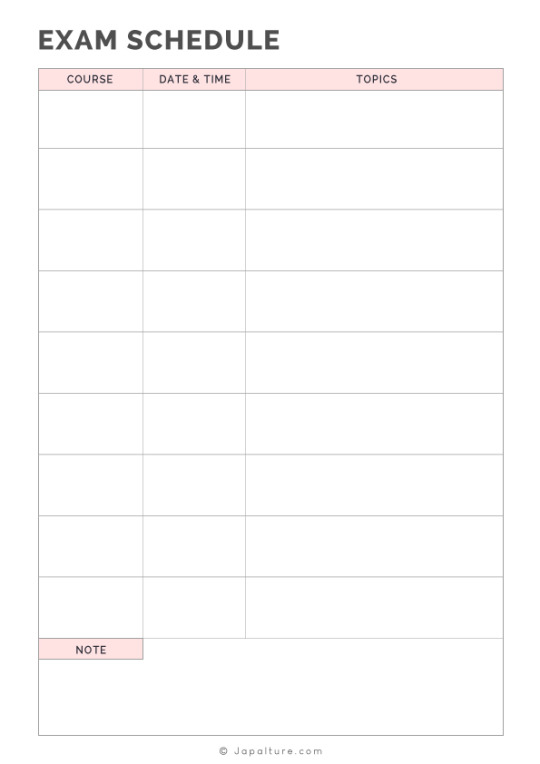
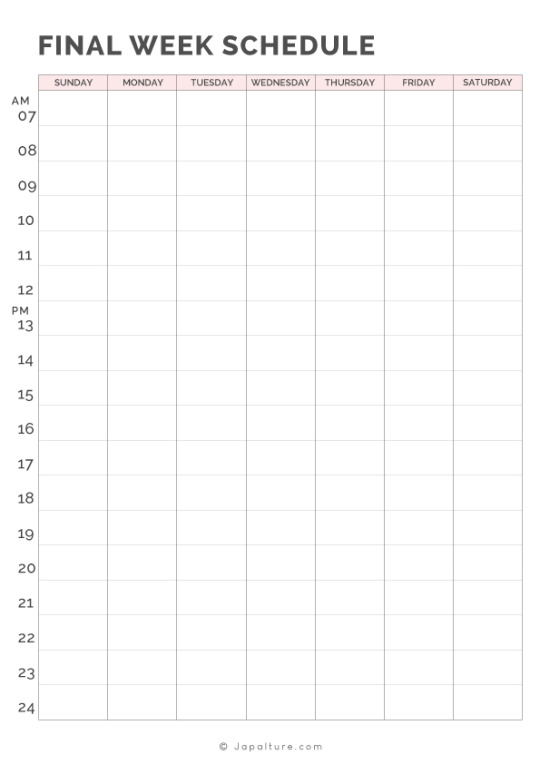


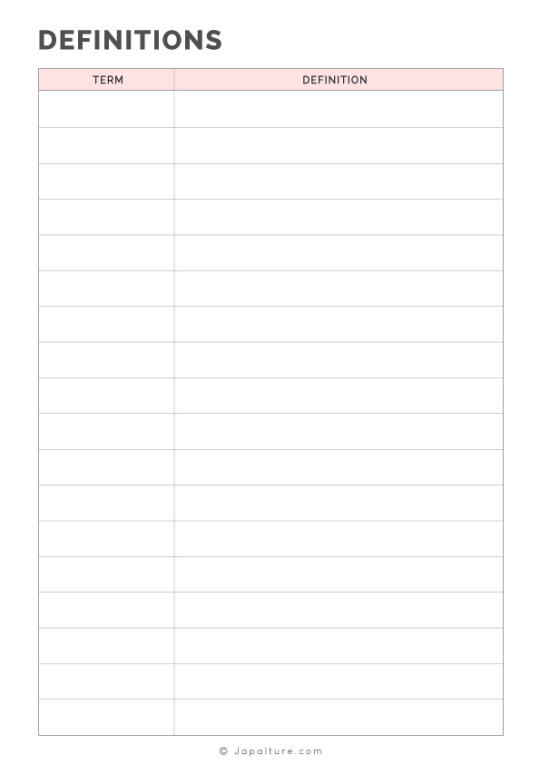


Hi, there! I have a big exam next month and decided to create an exam study kit to organize and increase my productivity. I hope this exam study pack help your final exam. Good luck with your exam, everyone! We can do it!
Exam Study Pack Including
Final Exam Schedule
Final Exam Time Schedule (week)
Weekly Study planner
Monthly Style Study planner
Essay Planner
Glossary (definitions & terms)
Note
Click HERE to download the printable (PDF). Please save the file to your computer and open with Adobe Reader DC. Use Adobe Reader, otherwise, it will not work correctly and colors may display completely different. Please let me know if you are having trouble downloading the file.
* Important note: All files are Personal Use (non-commercial) ONLY! Please Do NOT Copy and Edit. Please Do No distribute and sell these files or upload them to other websites.
By the way, I decided to post a new printable item each week (every Saturday). Tomorrow I will post “Free Printable Thanksgiving 2018 Wine Labels” including using a Japanese pattern. So please come back to my blog tomorrow!
18K notes
·
View notes
Photo

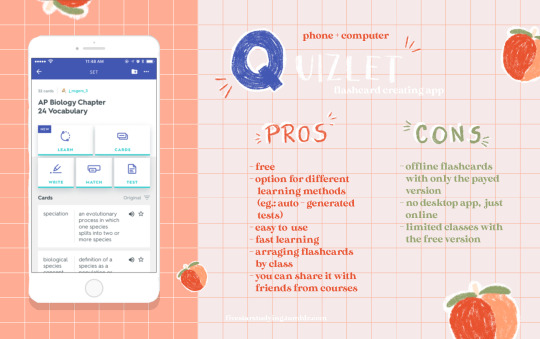


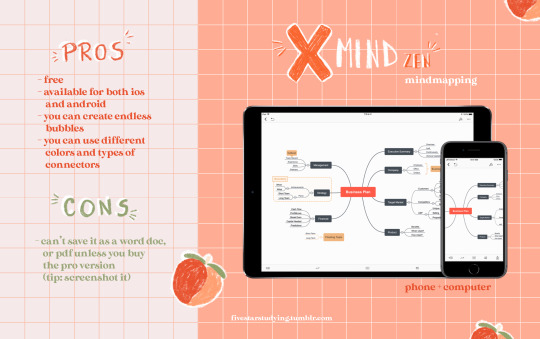



𝓂𝓎 𝒻𝒶𝓋𝑜𝓇𝒾𝓉𝑒 𝒶𝓅𝓅𝓈 𝒻𝑜𝓇 𝓊𝓃𝒾 🍑
In this post, I list 7 of my all-time favorite apps / chrome extensions that I use daily. I hope I can help out some fellow uni students who are struggling. This might help make studying less painful and a tiny tiny bit more enjoyable.
love, edith 🌾
ig.: @fivestarstudy_
14K notes
·
View notes
Text
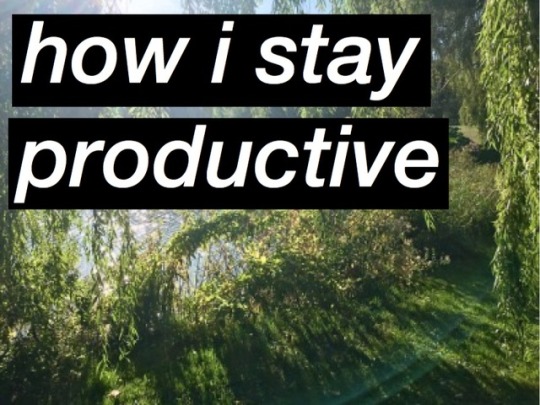
(in college)
so! i have adhd but you don’t gotta have adhd to benefit from these tips. everyone struggles with lack of focus and executive dysfunction sometimes, especially in college. so without further ado,
1. go to the library every day.
your “library” doesn’t have to be a library, but it helps if it’s a place outside of your home/dorm. pack your bag and head to that place within an hour of waking up. do work, study, even and especially if there isn’t anything urgent to do. this is a huge one for me because getting to a productive space is half the battle and once i get there, i get in this mindset of “well, i walked all the way here. might as well get shit done”.
2. embrace the discomfort. discipline isn’t wanting to do something, it’s doing it regardless of your emotions. i know it’s hard but separate your feelings from the task at hand. don’t give yourself time to think, just do it. this will get easier over time as you build discipline.
3. use mechanical, low dread level tasks to get yourself in the zone. this means taking notes or working on your planner so you get into the rhythm of productivity. after you’re in the zone, start that essay without giving yourself time to dread it.
i know there’s only three tips but i didn’t want to include typical, motivation based tips. as always, these methods don’t work as well if you aren’t sleeping enough, eating right or prioritizing emotional needs. i hope u have a good productive day!!
3K notes
·
View notes
Text

(in college)
so! i have adhd but you don’t gotta have adhd to benefit from these tips. everyone struggles with lack of focus and executive dysfunction sometimes, especially in college. so without further ado,
1. go to the library every day.
your “library” doesn’t have to be a library, but it helps if it’s a place outside of your home/dorm. pack your bag and head to that place within an hour of waking up. do work, study, even and especially if there isn’t anything urgent to do. this is a huge one for me because getting to a productive space is half the battle and once i get there, i get in this mindset of “well, i walked all the way here. might as well get shit done”.
2. embrace the discomfort. discipline isn’t wanting to do something, it’s doing it regardless of your emotions. i know it’s hard but separate your feelings from the task at hand. don’t give yourself time to think, just do it. this will get easier over time as you build discipline.
3. use mechanical, low dread level tasks to get yourself in the zone. this means taking notes or working on your planner so you get into the rhythm of productivity. after you’re in the zone, start that essay without giving yourself time to dread it.
i know there’s only three tips but i didn’t want to include typical, motivation based tips. as always, these methods don’t work as well if you aren’t sleeping enough, eating right or prioritizing emotional needs. i hope u have a good productive day!!
3K notes
·
View notes
Text
how to get stuff done
1. invent a deadline for yourself and stick to it. either you finish things early and have free time for other things or you don’t meet your deadline and still have a few days to catch up before it matters
2. celebrate every little achievement. it’s frustrating to wait to get an assignment/exam back because you get no immediate satisfaction. after every task you complete go for a walk, see a friend, cook, get a hot chocolate. feel good about your progress without having to wait for someone else to tell you that you’re doing a good job
3. organise your to-do list using these 4 categories:
important and urgent - do this now!
important but not urgent - schedule this
not important but urgent - delegate this or schedule it for later
not important and not urgent - don’t do this until you have done everything else
4. divide and conquer. if you have a paper to write divide it up into easy chunks e.g. plan/first draft/second draft/checking etc. and tackle these one at a time. don’t just write ‘history paper’ on your to-do list because you will feel unproductive until you tick it off, even if you are making progress
5. don’t forget to put self-care on your to-do list. make sure every day you write down and tick off ‘drink water’ ‘get some fresh air’ ‘take some time away from the computer’ ‘brush teeth’ ‘shower’. you will feel productive and also be looking after yourself, both of which will boost your general productivity
6. study slots not study tasks. break up your tasks into time slots and write those on your to-do list. instead of ‘revise German Unification’ my to-do list will say ‘1 hour German Unification’. after 1 hour I will stop and tick off that task. then write it again later or the next day if I want to do more. it is easier to quantify tasks (especially humanities/arts revision) by time rather than by topic.
7. have a visual indicator of your progress. if you think you need to spend 6 hours on German Unification in total then draw a rectangle and divide it in 6 and colour one segment in for every hour you work so you can see your progress. this will serve as motivation and as a reward for hard work
8. find a friend with a similar/better work ethic than you and sit together in a library and study hard. it’s nice to surround yourself with people who are also working hard for motivation, and for someone to talk to during your study breaks
I hope this helps!
for some unconventional study tips click here or here
5K notes
·
View notes
Photo
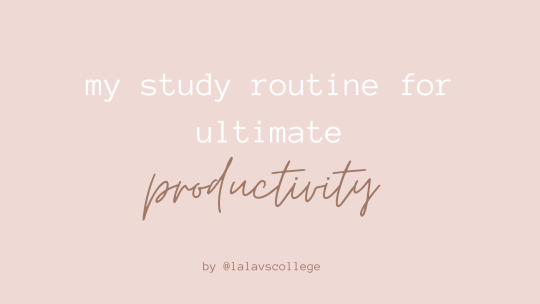
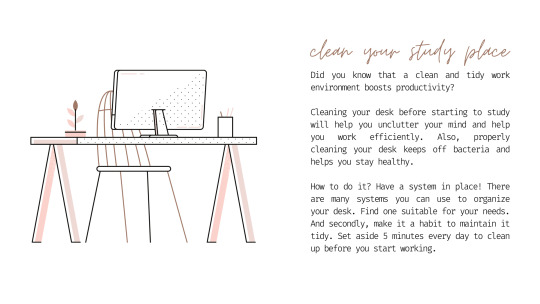
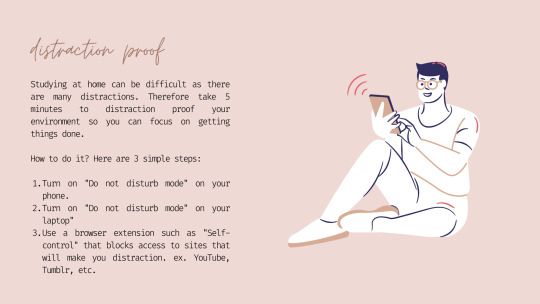
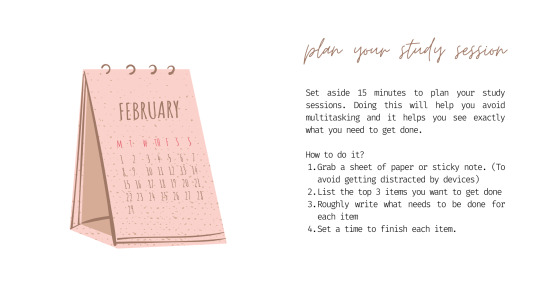
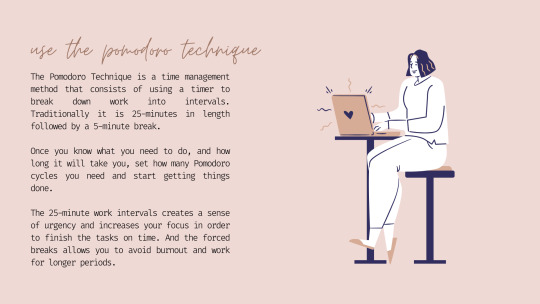
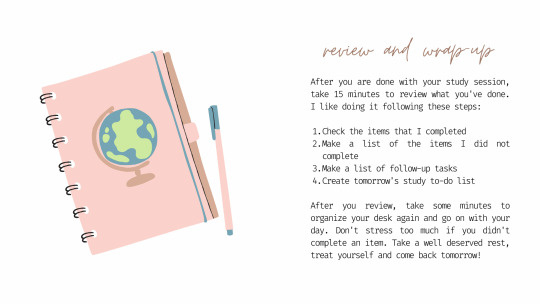
Hi, guys! Lala here. We all know the importance of having a morning and night routine, but I haven’t seen a lot of people talking about having a study routine. So I wanted to share mine with you and hopefully you guys can get some value out of it.
Do you have a study routine too or want to share some tips? Share them with me!
9K notes
·
View notes
Photo



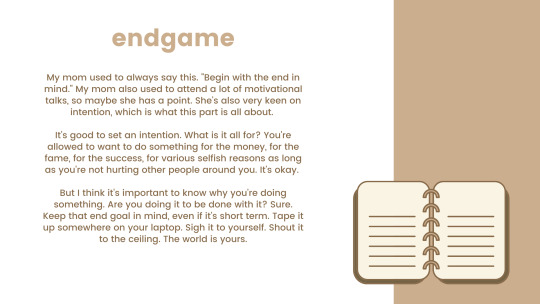

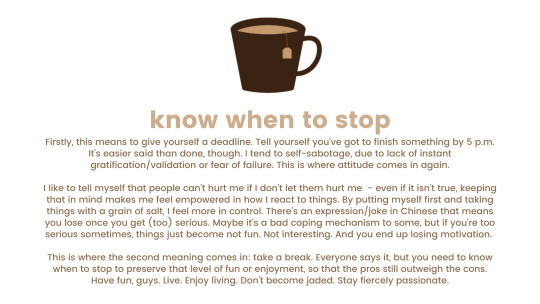
042420
As most people are working and studying from home right now, I wanted to share some concrete, implementable ways you can help yourself feel better. Though I believe productivity and quantity of work done (or lack thereof) doesn’t/shouldn’t translate into your self-worth and how you view yourself, when you get work done, you actually do feel better in your own body.
By the way, it’s the first time I’m formatting a tips/guide post like this, so I apologize that I couldn’t be more concise.
I’ve spoken to a licensed professional counsellor as well as to some professionals who have been working from home for a long time, and some of the advice above is from them. I’m also sharing from my own experience as someone who used to be very productive and an (ex-)overachiever, and still attach a lot of my self-worth to grades and other tangible accomplishments. I hope these slides can help you. In case it’s hard to read, I’ve included it (reworded) in text form if you’d like to read more.
Keep reading
15K notes
·
View notes
Text
Morning Habits Worth Starting (Especially for College)
Give yourself enough time to get ready before you have to leave in the morning. For me this means setting my alarm about an hour before the time that I have to get my foot out the door. Eat a proper breakfast, do a little stretching, figure out your plan for the day. Having a slower paced morning is a lot more relaxing, and you can get your day started correctly.
Drink water first thing. I used to be a pretty heavy coffee drinker in the mornings in high school, but I realized that I could get away with a lot less caffeine if I started my morning off with a nice glass of cold water. You’re probably dehydrated after sleeping and water helps wake you up.
Make your bed. Making your bed is a visual reminder that sleeping time is over and that it’s time to get up! If I have a messy bed, I want to climb in and snuggle back into my blankets. This is especially true in the winters when it’s cold and dark. The movement also helps you wake up, which brings me to my next point:
Move! Your! Body! You don’t necessarily have to run through an entire yoga routine or go for a run (but hey, props to you if you do), but getting some movement in your mornings will help you wake up. I like to stretch a little bit, warm up my joints, maybe loosen up my limbs. It helps to get your blood flowing.
Open your curtains. In the winter it might be kind of dark and depressing where you live, so this isn’t always something recommended. I like to open my curtains when it’s sunny out so I can get some natural light, which helps your circadian rhythm so you wake up better - and fall asleep at night better.
Do something productive before your class begins. If your first class is super early, this might not apply. But I find it tremendously helpful to get something done, whether it be a flash card set, a work out, or a load of laundry, before my first class. It’ll get you into a productive mood for the rest of the day, and even if you aren’t productive for whatever reason, you can go to sleep knowing that at least you got something done that day!
27K notes
·
View notes

























